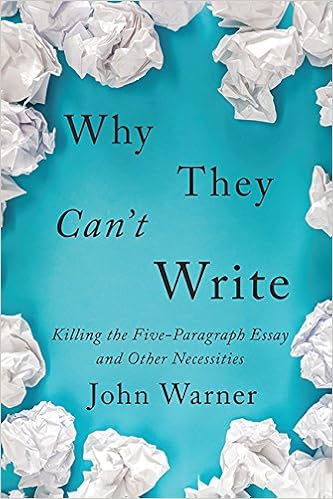For my 35 years as an educator, I have taught writing and fought a seemingly fruitless battle against know-nothings who either pontificate about or make policy for education.
If I weren’t already an eager fan of John Warner’s blogging at Inside Higher Ed, I feel sure I would have immediately blown a gasket over his newest book’s title: Why They Can’t Write. Although almost immediately the subtitle would have definitely given me hope: Killing the Five-Paragraph Essay and Other Necessities.

I can assure you right off that this is not the sort of drivel the title echoes—Why Johnny Still Can’t Read — And What To Do About It—and instead is a very powerful call for teaching writing well from Warner who is both an accomplished writer and a seasoned writing teacher.
In fact, my strongest recommendation for this book is based on Warner’s expertise across writing and teaching combined with his commitment to remaining himself a student of both. Warner embodies my argument that teaching writing and writing are journeys, not destinations.
The opening, “Our Writing ‘Crisis,'” makes a really important and contrarian argument that, I think, guides the entire book. To the title’s assertion/question, Warner explains: “‘They’re doing exactly what we’ve trained them to do; that’s the problem.'”
As a first-year writing teacher at the college level, Warner has witnessed much of the same dynamics I have experienced over about the same time period; if students struggle with writing in ways that are expected at the college level, much of that disconnect can be seen in those students having been taught what is essentially bad practice—focusing on correctness and correcting, conforming to prompts and templates, having over-simplified concepts of evidence and citation, performing very limited writing capabilities that parallel very weak thinking (linked to the five-paragraph essay that Warner rejects).
An excellent evidence-based companion to Warner’s book, in fact, is Applebee and Langer’s research on the teaching of writing at the middle and high school levels. They detail that while most teachers in all disciplines know more than ever about how to teach writing well (in ways Warner outlines in his book), students write less often and shorter pieces in English as well as their other courses.
The culprit? High-stakes accountability in the form of standards and, most of all, testing.
All teachers who have some responsibilities teaching writing should read this book, but those engaged with first-year writing may be most compelled by Warner’s messages.
Another strong aspect of this work is that Warner’s writing is always engaging while remaining very practical—something practitioners tend to demand.
I think his Part II really shines by highlighting problems: atmosphere (“‘School sucks'”), surveillance, assessment and standardization, education fads, technology hype, folklore, and precarity. Many of these are recurring concerns I have experienced teaching high school English throughout the 1980s and 1990s as well as college-level writing since 2002.
Stylistically, Warner has chosen to be conversational, so this volume is not heavily cited with current research on composition. While some may bristle at this choice, I am very comfortable noting that Warner’s critiques and recommendations match well with that research base (again, consider Applebee and Langer, but also Peter Smagorinsky and a long list of K-12 researchers and practitioners advocating writing workshop).
What teachers find in Warner is a confession that writing and teaching writing are damned challenging. But he also offers foundational concepts and practices if our goal is to foster developing writers who think and compose by choice and with purpose.
This is not about test-prep. This is not about inauthentic compliance masquerading as writing.
Being a writer and teaching writing are mostly about problems. Warner recognizes the problems (and if you teach writing, so will you), and the challenges, but also provides some important reassurances that we can teach writing better, probably well, and then, our students? Well, they can write if offered the opportunity.


One thought on “RECOMMENDED: John Warner’s “Why They Can’t Write””
Comments are closed.